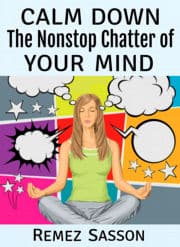
Meditation is often discussed as a powerful practice for the mind, yet it remains shrouded in mystery for many.
What really happens when you meditate, and how can it benefit you?
If you, like many others, want to learn more about meditation, you can find answers to your questions here.
Questions and Answers About Meditation
Let’s dive into 20 commonly asked questions about meditation in a simple, straightforward Q&A format.
1. What is meditation?
Meditation is a practice where you focus your mind to achieve mental clarity, emotional calmness, and an elevated state of awareness. It’s a way to train your mind to be more present.
2. How do you meditate?
Find a quiet space, sit comfortably, close your eyes, and focus on your breath, a mantra, or an object. If your mind wanders, gently bring it back to your point of focus.
3. What exactly do you do in meditation?
You concentrate your attention, observe your thoughts without judgment, or practice specific techniques to quiet your mind. It’s about being aware and present.
4. How long should I meditate?
Start with 5-10 minutes daily, then gradually increase to 20-30 minutes as you get more comfortable. Consistency is more important than duration.
5. Do I need to sit cross-legged?
No. You can sit on a chair, cushion, or even lie down. The key is to be comfortable yet alert so you don’t fall asleep.
6. What’s the best time of day to meditate?
Many find morning meditation effective for setting a calm tone for the day, but any time that suits your schedule is good. Evening meditation can also help unwind.
7. What if I can’t stop thinking?
It’s normal for thoughts to arise. Meditation isn’t about eliminating thoughts but learning to notice them without getting carried away. Gently return your focus each time. As you continue this practice, there will be fewer and fewer thoughts demanding your attention.
8. How do you calm your mind in meditation?
Focus on your breath, repeat a mantra, or visualize a calming scene. Over time, your mind will learn to settle into a quieter state.
9. Can I meditate with music?
You can use soft, calming music or nature sounds if they help you focus. However, traditional meditation is often practiced in silence.
10. What’s the purpose of focusing on your breath?
The breath anchors us to the present moment. Focusing on it helps center our minds and calm the chatter of the mind.
11. What is a mantra?
A mantra is a word, phrase, or sound repeated to aid concentration. Common examples are “Om” or “Peace.” It can be chosen based on personal or spiritual significance.
Read our article on mantra meditation.
12. Can meditation help with stress?
Yes, meditation can reduce stress by calming the nervous system, promoting relaxation, and improving the ability to easily handle stressful situations.
13. How does meditation improve focus?
Regular practice trains your mind to concentrate better and reduces the tendency to get distracted, enhancing your attention span over time.
14. Is there a right way to meditate?
No, there are many forms of meditation, like mindfulness, observing thoughts, transcendental meditation, repeating a mantra, self-inquiry meditation, and many more. Find what feels comfortable and effective for you.
15. Can anyone meditate, or is it only for spiritual people?
Anyone can meditate. It’s a secular practice that benefits people of all backgrounds, not limited to spiritual or religious traditions.
16. How long does it take to see the benefits of meditation?
Some benefits, like reduced stress, may be felt almost immediately. Others, like improved focus or emotional stability, may take weeks or months of regular practice.
Read about the benefits of meditation.
17. Can meditation help with sleep problems?
Yes, meditation can promote better sleep by calming the mind and relaxing the body, making it easier to fall asleep and stay asleep.
18. What’s the difference between meditation and mindfulness?
Mindfulness is the act of being fully present and focused on the moment, while meditation is a practice that is more of reflection, contemplation, and going inwards. They complement each other.
19. Is guided meditation effective?
Yes, guided meditations can be very helpful, especially for beginners. They provide structure and direction, making it easier to stay focused. However, you need either someone to guide the meditation or you listen to a pre-recorded guided meditation.
Read about guided meditation.
20. Do I have to meditate every day?
Daily practice is ideal to gain consistent benefits, but even a few times a week can be helpful if that feels overwhelming.
Start Your Meditation Journey after Reading This Meditation FAQ
We hope you found this meditation FAQ useful.
Meditation doesn’t require perfection-only your willingness to devote some time and effort to it.
Whether you’re seeking more calmness and tranquility, better focus, greater emotional balance, mental clarity, inner peace, or expanding your consciousness and awareness beyond the individuality and humdrum life, taking a few moments to meditate can be a step toward a more peaceful mind.
Image source – DepositPhotos


